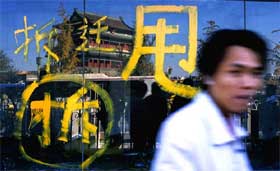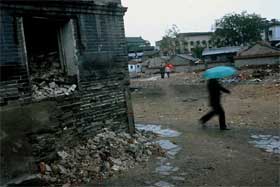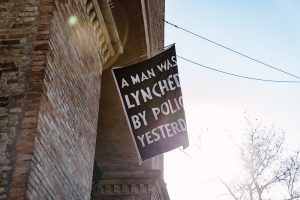Beijing’s historic layout, which dates back six hundred years to the time of the Ming Dynasty, consists of hutongs, narrow alleyways that run in a maze-like fashion around the centre of the city. The hutongs, while revered as a direct link to China’s venerated past, are also regarded as a source of shame – representing a backward way of living that Beijing does not want the world to see in 2008 for the summer Olympics.
 The character Chai that means “destruction” or “destroy” earmarks the building to be demolished
The character Chai that means “destruction” or “destroy” earmarks the building to be demolished
The destruction of hutongs has been taking place for a number of years, but since Beijing was awarded the Olympics, the rate at which they are now being cleared has increased exponentially.
According to UNESCO, in the past three years a third of the 62km squared area that makes up the central part of the old city has now been destroyed. This has displaced close to 580,000 people.
The overwhelming feeling amongst many locals is one of reluctance that they cannot do anything about what is happening to them. Frustration by some residents escalated in 2003 with a spate of suicide attempts, aimed at highlighting the hutong clearance plight.
 The true impact of these events may only be fully seen after 2008, when the construction dust has settled slightly over a post-Olympics Beijing. What is clear now is that a fundamental way of life that has existed for hundreds of years is being destroyed. It is a bittersweet irony that the very ‘Chinese flavour’ the Communist Party want to project to the outside world in 2008 and beyond, is swiftly disappearing.
The true impact of these events may only be fully seen after 2008, when the construction dust has settled slightly over a post-Olympics Beijing. What is clear now is that a fundamental way of life that has existed for hundreds of years is being destroyed. It is a bittersweet irony that the very ‘Chinese flavour’ the Communist Party want to project to the outside world in 2008 and beyond, is swiftly disappearing.
The article made me think of Baron Haussmann. Wikipedia writes: “There are two views of Baron Haussmann: One depicts him as the man who destroyed Old Paris, and the other as the man who created New Paris.”
Via the excellent Subtopia Open Democracy. Photo show by Sean Gallagher.







